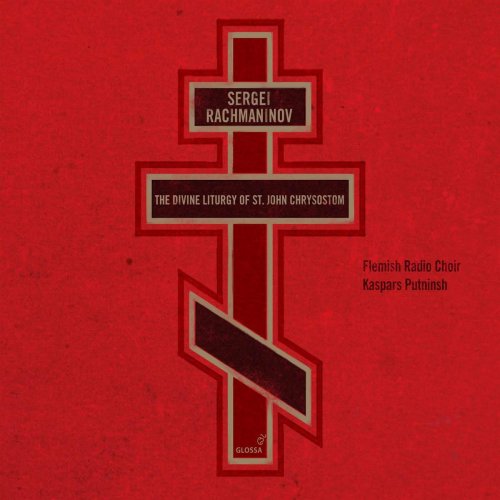
Flemish Radio Choir, Kaspars Putninsh - Rachmaninov: Liturgy of St John Chrysostom, Op. 31 (2006)
BAND/ARTIST: Flemish Radio Choir, Kaspars Putninsh
- Title: Rachmaninov: Liturgy of St John Chrysostom, Op. 31
- Year Of Release: 2006
- Label: Glossa
- Genre: Classical
- Quality: FLAC (tracks)
- Total Time: 01:05:08
- Total Size: 259 Mb
- WebSite: Album Preview
Tracklist:
1. The Great Litany 00:46
2. Bless the Lord, O my soul 04:03
3. Glory be to the Father 03:04
4. In Thy Kingdom 05:40
5. Come, let us Worship 01:38
6. O, Lord 02:42
7. The Augmented and Subsequent Litanies 05:35
8. The Cherubic Hymn 05:09
9. The Litany of Supplication 00:50
10. The Creed 07:27
11. A Mercy of Peace 06:21
12. To Thee We Sing 02:51
13. It is Truly Meet 02:57
14. The Lord's Prayer 05:38
15. The Communion Hymn, "Praise the Lord of the Heavens" 02:39
16. Blessed is He - We Have Seen the True Light 01:24
17. May our Mouths be Filled 04:06
18. Blessed be the Name of the Lord 00:47
19. Glory to the Father 01:31
Performers:
Flemish Radio Choir
Kaspars Putninsh
1. The Great Litany 00:46
2. Bless the Lord, O my soul 04:03
3. Glory be to the Father 03:04
4. In Thy Kingdom 05:40
5. Come, let us Worship 01:38
6. O, Lord 02:42
7. The Augmented and Subsequent Litanies 05:35
8. The Cherubic Hymn 05:09
9. The Litany of Supplication 00:50
10. The Creed 07:27
11. A Mercy of Peace 06:21
12. To Thee We Sing 02:51
13. It is Truly Meet 02:57
14. The Lord's Prayer 05:38
15. The Communion Hymn, "Praise the Lord of the Heavens" 02:39
16. Blessed is He - We Have Seen the True Light 01:24
17. May our Mouths be Filled 04:06
18. Blessed be the Name of the Lord 00:47
19. Glory to the Father 01:31
Performers:
Flemish Radio Choir
Kaspars Putninsh
Unlike Westerners working with Catholic and Protestant texts, Russian composers setting Orthodox liturgy have had only an intermittent series of inspirations to draw on. Rachmaninov, with his Divine Liturgy of St. John Chrysostom of 1910, was preceded by Tchaikovsky and a few other composers in setting this text, but the idea of an orchestral, polyphonic setting of the liturgy that could be performed outside of a church was still seen as undesirable or even blasphemous by many Orthodox clerics. The work found favor neither with Russian Communists nor with the underground and fervent church, and after World War I it fell into obscurity, to be resurrected only in the 1980s. It is thus much less often heard than Rachmaninov's Vespers (All-Night Vigil) or his choral symphony The Bells. The work has none of the basso rumblings of the Vespers, and it seems to have been written with an eye or ear toward pleasing its churchly critics: its language is spare and often chant-like, with frequent use of monophonic lines and organum-like parallelisms. In a performance world conditioned to think lush when dealing with Rachmaninov, this poses a problem. But with this recording by the modest-sized under , the problem has been solved. This is, quite simply, one of the most sonically beautiful albums ever recorded. (It was auditioned on a fine conventional stereo; those able to hear it in the intended SACD surround sound may reap yet deeper ecstasies.) The choir insinuates itself into the spaces of the Jesuit Church in Heverlee, Belgium, in such a way that they seem to be attuning each line to the resonances of the building, and the prism-like effects that issue forth from Rachmaninov's minimal textures are things of which Glass and Reich can only dream. A drawback in the presentation of this disc is the omission of texts, especially annoying in view of the five languages in which the notes are given (is there any European who couldn't have managed if they were condensed to three?); the texts of the liturgy are found easily enough on the Internet, but it takes a bit of work to match them up with what Rachmaninov is setting -- certain portions, as in a Western mass, are cut or left to a leader. Nevertheless, the sheer sonic luxuriance of this release is something not to be missed.
DOWNLOAD FROM ISRA.CLOUD
Flemish Radio Choir, Kaspars Putninsh - Rachmaninov Liturgy of St John Chrysostom.rar - 259.6 MB
Flemish Radio Choir, Kaspars Putninsh - Rachmaninov Liturgy of St John Chrysostom.rar - 259.6 MB
As a ISRA.CLOUD's PREMIUM member you will have the following benefits:
- Unlimited high speed downloads
- Download directly without waiting time
- Unlimited parallel downloads
- Support for download accelerators
- No advertising
- Resume broken downloads


